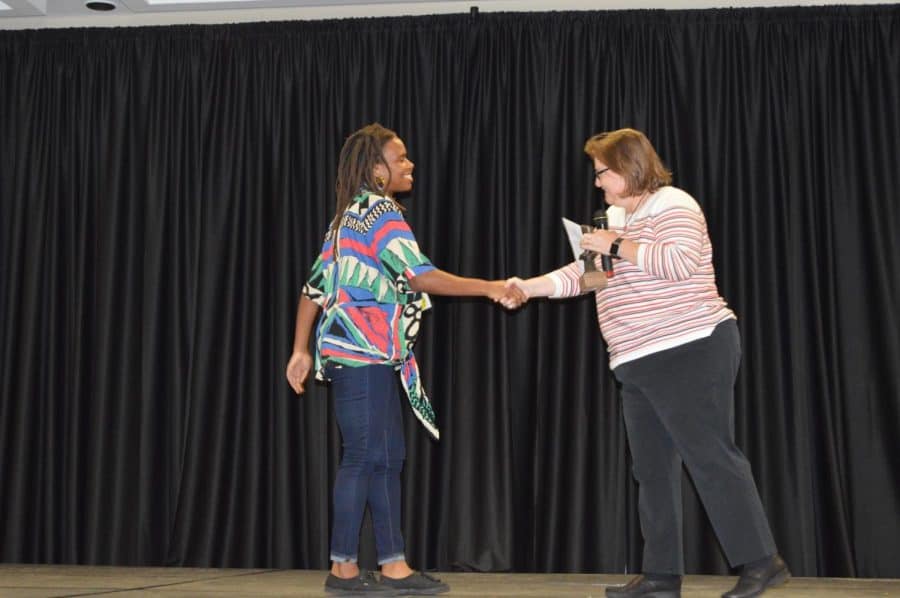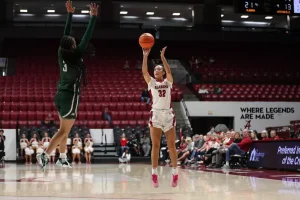Undergraduate filmmakers seek fairness in award
April 1, 2019
Dark curtains surrounded a pitch-black screening room this Saturday, allowing audience members of the Black Warrior Film Festival (BWFF) to be fully immersed in the thrilling, mysterious or compelling world each of the short films conjured up. But six student directors watched with a different kind of anticipation, knowing that their film would potentially win them a $10,000 stipend.
The late Everett Holle, a UA alumnus, created the Holle Awards for Excellence in Creativity and Communication to support leaders in student creativity on a national level. Distinct from the other Holle Awards, the Holle Award for Excellence in Filmmaking is presented at the BWFF. Worth $10,000, the award not only helps encourage creation, but it is also often used to aid students’ creative endeavors in filmmaking, which can be costly. The award is the sole monetary stipend presented at the BWFF.
While many filmmakers strive to earn the Holle award, some students feel that the eligibility requirements for the award are inequitable. To be eligible for the prize, students can be enrolled in either undergraduate or graduate programs. Maya Champion, an instructor of journalism and creative media, said that this can be unfair to undergraduates.
“It’s really apples and oranges,” Champion said. “And I’ve always thought that it’s not really fair for our students to compete against the graduate students. I don’t know how much say I have about that, but I don’t like it.”
Blake Hudson, a senior majoring in telecommunication and film and the recipient of the 2019 BWFF award for best documentary, agreed that a disparity in resources could be discouraging.
“There are definitely a lot of us that feel like we fall at the bottom of the totem pole, just like at the bottom of the competition for the Holle for Filmmaking,” Hudson said. “Simply because we don’t have the resources, we don’t have maybe the time.”
Though students may be inspired to raise the standard for their own work by viewing and competing against graduate work, Champion mentioned some restrictions that undergraduate students face.
“Theoretically, [watching Holle Award submissions] helps their films in a sense that, okay, they are raising the level of their productions to that,” Champion said. “Now, there’s only so much they can do, because they’re restricted by time and money.”
Whereas graduate students sometimes have the opportunity to work on their films for years, undergraduates often complete their pieces within weeks.
“The more time that you have to sort of develop your ideas, like with the MFA, you know, this is primarily what they’re doing,” said Kristen Warner, a juror for the Holle Award for Excellence in Filmmaking and an associate professor of journalism and creative media. “This is, like, two years of skill-developing and learning more intensely what the craft is.”
Nick Corrao, the faculty advisor for the BWFF and the coordinator for the Holle award, agreed that some programs may offer more time, but said UA students are up for the challenge.
“A lot of times, the graduate students are developing projects over a couple of years, so I think that says to the undergraduate students, if you really want to compete at a national level, you have to look at the work that’s being produced by graduate students and aspire to that, and I think at least here at UA, definitely our students are doing that,” Corrao said.
Additionally, Corrao noted that the Holle Award eligibility requirements are not unlike requirements put in place in other festivals around the country.
“Most of the film festivals around the country do not make a distinction in terms of graduate or undergraduate,” Corrao said. “So ultimately the call was to be in line with the rest of those competitions and looking for the best student work that’s being produced in the country.”
Despite the fact that graduate students create their work in an environment that’s more singularly focused on filmmaking, Connor Simpson, a UA alumnus currently studying screenwriting and directing as a graduate student at Columbia University, said that the competition is a “fairly even playing ground.” Simpson said that many MFA students enter the program without having prior film experience or education.
“A lot of our classmates didn’t do anything in film before they came,” Simpson said. “We have a really diverse program in terms of backgrounds.”
Raven Jackson, a graduate student studying film at New York University, is one such student who first experienced formal film education in graduate school, previously studying communications as an undergraduate at Austin Peay State University. After completing her undergraduate degree, she couldn’t ignore the pull she felt toward film.
“I was always interested in film, but I didn’t have the technical background, the technical knowledge of how to make a film and so I always felt like, ‘Oh, I guess that’s not for me,’ because you need to know the technical aspects of filmmaking.”
But Jackson’s short film “Nettles” captured not only the audience at the BWFF, but the Holle Award jurors, earning her the 2019 Holle Award for Excellence in Filmmaking and affirming that filmmaking is most definitely “for her.” Jackson said that in her opinion, a film’s narrative is more powerful than its production quality.
“I think the technical aspects of it are the least important honestly,” Jackson said. “I don’t think production value matters, I mean, of course it matters on a certain degree, but really, what’s the heart of the story? And I don’t feel like that’s anything you can find in a grad program, I think you have to go to you and sit down with yourself and say, ‘What story do I want to tell?’ and, ‘Why am I telling it?’”
In “Nettles,” Jackson depicted a story of stinging moments in a range of women and girls’ lives through a series of chapters, each portraying a spectrum of characters and scenes. In some scenes, Jackson utilized nude characters, which she said, as a student, was an important learning experience.
Though Jackson was able to harness nudity on film with no restrictions, the same could not be done in the UA film department.
“Basically we have pretty major restrictions on the use of content that involves guns, drugs, nudity,” Hudson said.
Hudson has a qualm about the University’s recent film restrictions. In his opinion, the restrictions prevent students from learning about and utilizing certain filming techniques or concepts with the security that professors will be looking over their shoulder and guiding them in the right direction.
“How can we be expected to compete with these films that cover very serious, very genuine topics, when we aren’t being encouraged to responsibly do that?” Hudson said. “We’re just completely restricted.”
Champion said there are safety concerns the film department must take into consideration when creating these restrictions.
“They’re undergraduates, they’re not graduates. And they’ve got to take every safety precaution necessary, because you can make a beautiful film without those things, and frankly I’m tired of seeing all that,” Champion said.
Warner said these limitations could even prompt filmmakers to enhance their creativity.
“I think smart filmmakers, regardless of if you’re an undergraduate or graduate or a professional out in the world, limitations and parameters actually become really productive. And it is the smart savvy filmmaker who knows how to think past the literal and think into how to make their point in a more expressive, creative fashion.”
Though undergraduate students at the University and elsewhere may have different obstacles or restrictions to contend with than graduate students applying for the Holle Award for Excellence in Filmmaking, Wade Scanlan, a senior majoring in telecommunication and film and co-director of the BWFF, said this could be a “taste of the real world.”
“This is a really competitive industry, and you’re always going to be up against someone who may have a bigger budget than you or has people with more experience behind their back,” Scanlan said. “So I kind of just see it as that drive to do the best that I can no matter what.”










